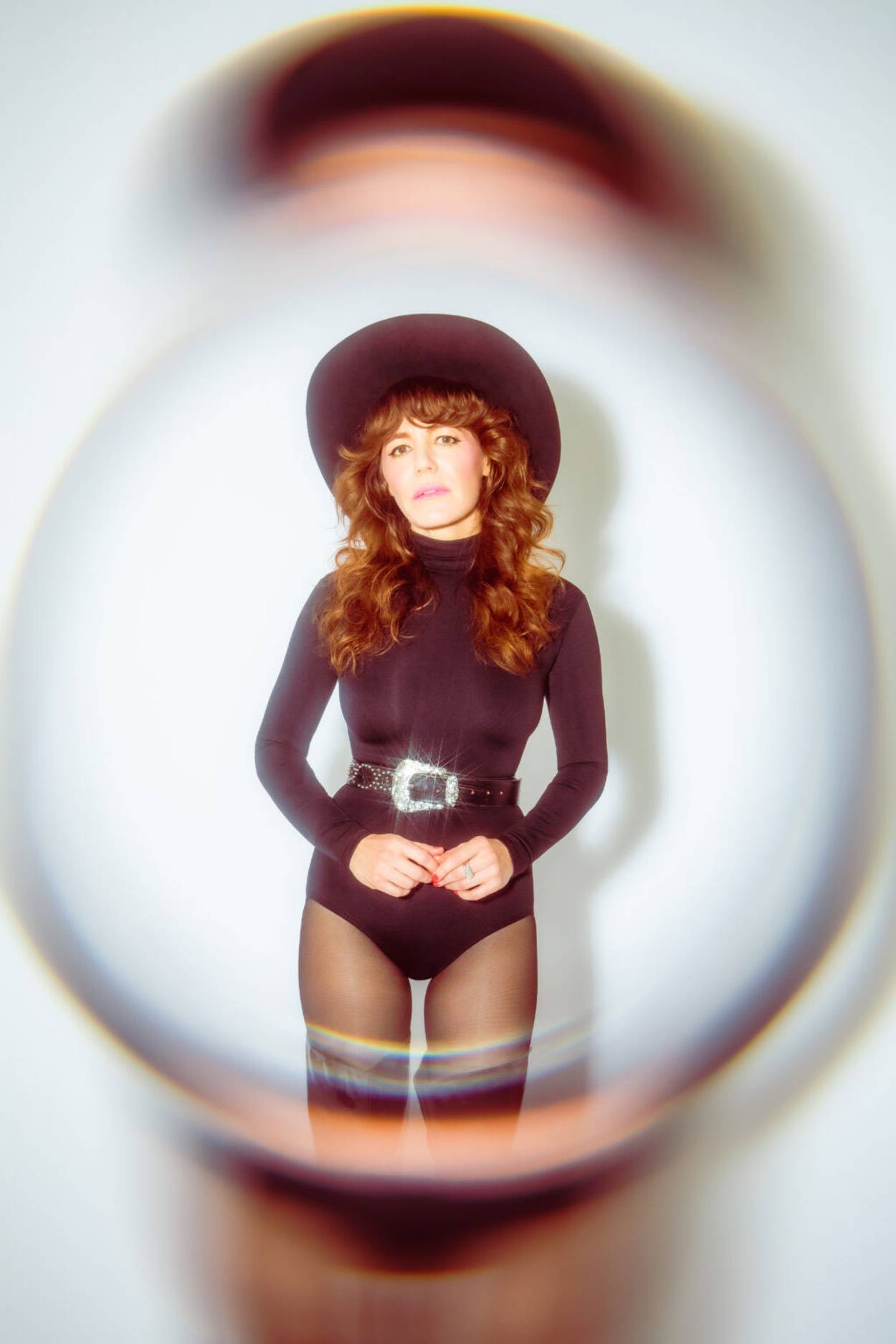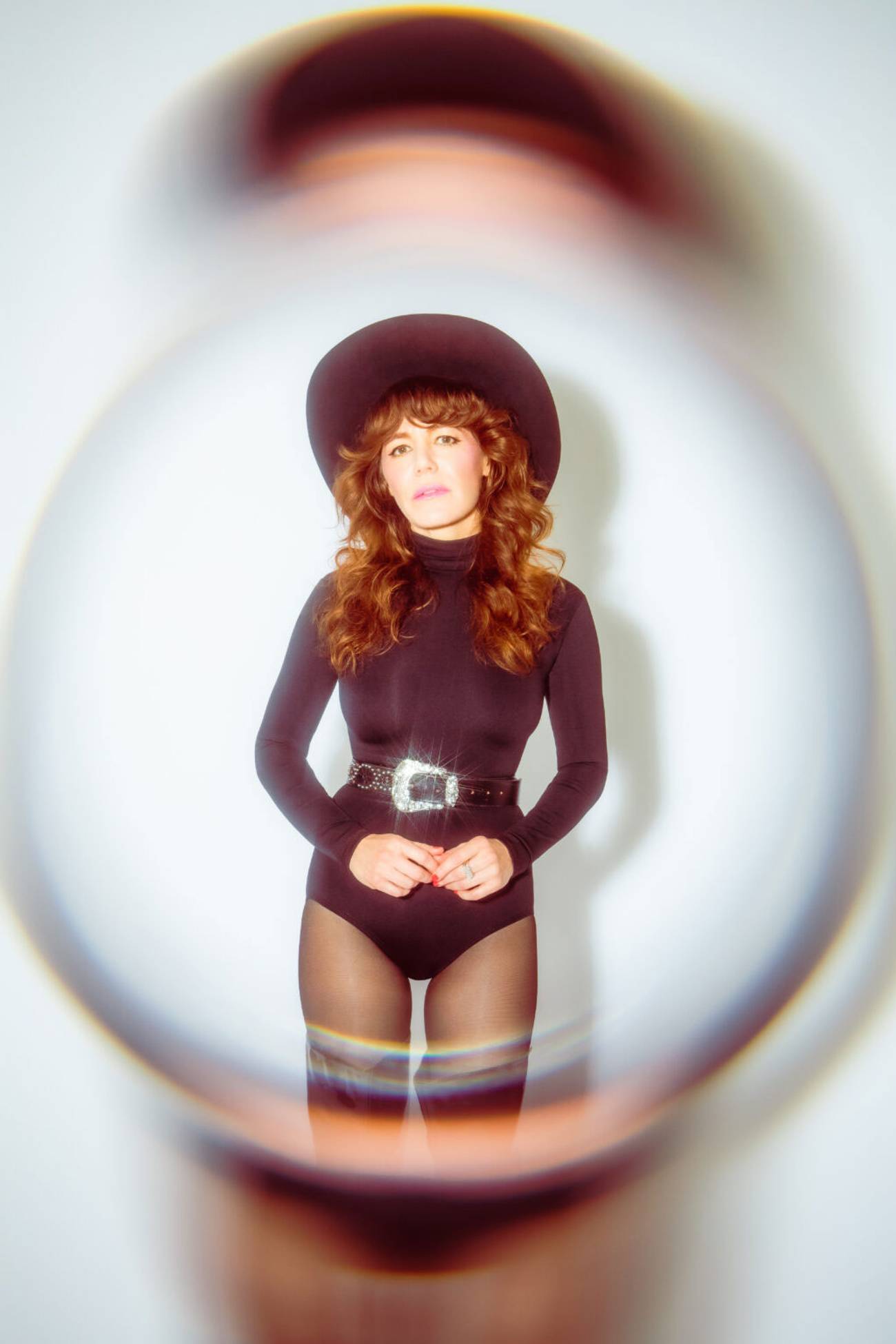The Jenny Lewis Show
The indie star’s latest is a Bakersfield sound-drenched ode to self-destruction. Don’t say she didn’t warn you.




In the pages of The Nation, M.L. Rosenthal, reviewing Robert Lowell’s Life Studies in 1959, came up with this term that stuck: confessional poetry. But it didn’t stick to everyone. Joni Mitchell disliked anyone comparing her to Sexton or Plath or even using the word “confessional.” Joni didn’t confess. She revealed. She disclosed. She was, she said, a penitent of spirit.
But the idea of poetry or song as confession is still irresistible. Sometimes the shoe fits. I’m thinking of this while under the spell of Jenny Lewis’ new album, Joy’All, released this month on Blue Note. Listening to it is like having a flirty, boozy conversation with someone too smart and talented to be self-sabotaging but is fully aware that it is not only what she does, it’s who she is. This is her grand subject, and it has been since she was the lead singer of Rilo Kiley, the indie band that helped get you through the zeroes. But it’s the Jenny Lewis show now. It’s last call, the lights are coming up, you have to be up early tomorrow, but you just can’t help it. This woman is absolutely compelling, and she knows things you’ll never know.
And one thing she sure knows is how to pick ’em. Romances have a way of spectacularly not working out for this woman, which seems so wrong, because you are so on her side. She’s always the other woman, not the stable one with the family. “She’s not me,” she sings. “She’s easy.” You are sure Jenny Lewis is worth the effort. There are so many songs with this theme that it would be a very long song cycle to perform them in one evening, from the Rilo Kiley mini-masterpiece “Does He Love You” (written in the second person as a letter, from the mistress to the missus) to “Just One of the Guys” (at the appointed hour, she couldn’t be like one because of a certain ticking clock). She spent a couple of years suffering from severe insomnia. The Jenny Lewis show could not be turned off.
“Most people are not with their first choice. That’s what keeps the jukebox playing.” Thus spake Willie Nelson, who is name-checked on “Love Feel,” from Joy’All, along with Marvin Gaye, Hank Williams, Johnny Cash, John Prine, and Waylon Jennings, and that’s just part of the source material here. The best country songs are about being alone and forsaken, but Lewis’ songs are also brimming with pop hooks and rock riffs. The hooks are meant to dig in forever, but in real life it doesn’t seem to happen.
It is fitting that Jenny Lewis, a high roller in every sense, was born in Las Vegas. But she really came out of the Bakersfield sound—where Laurel Canyon meets the Grand Ole Opry, when Hank was on it. When she was very little, her parents—struggling performers living on welfare—started making money off her: first commercials, then sitcoms, then parts in movies. (Lewis is the only grown-up child star who distinguished herself in rock ’n’ roll, at least since Rick Nelson.) They were suddenly living large, and she became estranged from both of them. Her mother blew everything on drugs. Her father just blew everything. Before they passed, she reconciled and forgave. That’s just the way she is. But the wound must have festered.
I don’t got no kids
I don’t got no kids
I don’t got no roots
I’m an orphan
Catch me if you can
I’m lacing up my boots
She was betrayed by her parents, and she was drawn to guys who would do her wrong; it’s no mystery. This new album sounds deceptively soothing, especially for those of us who grew up with the smooth sounds of the ’70s in the back seat. Two tracks have backing grooves that recall Fleetwood Mac’s “Gypsy” on Rumors, an album, according to John Mulaney, made by and for people cheating on each other. She always finds euphony, even when she sings about falling apart.
A Jenny Lewis song is the morning after. When Edith Piaf sang “Non, je ne regrette rien,” you have to wonder if that was a good idea. Maybe she could have regretted a little more. Regret is Jenny Lewis’ brand, and her indoor voice is her outdoor voice. She recently went on The Tonight Show and sang this, from the new album:
My forties are kicking my ass
And handing them to me in a margarita glass
I was infatuated with an older man
And then I dated a psychopath
So I’m 44 in 2020 and thank god I saved up some money
Time to ruminate like, what the fuck was that?
The f-bomb was deleted, but the rest of it was a bomb already. By the way, she offhandedly mentions that she dated a psychopath, as if this were par for the course, not the first or the last. (For anyone else, he would get a whole song.) She got no couch time, so there was no time to explain what the fuck was that. But she didn’t need to. It’s out there, as confessional as a therapy session or an old-fashioned phone call, or that intense last call conversation you are having now.
I used to think you could save me
I’ve been wondering lately
Heard she’s having your baby
And everything’s so amazing
It goes on and on and on and on
It is the thing that you want, and the things that you can’t get. It is the opposite of, “It’s not you, it’s me.”
But she’s not me, she’s easy
Is Jenny Lewis really not easy? She’s not.
Remember the night I destroyed it all
When I told you I cheated,
And you punched through the drywall
I took you for granted
When you were all that I needed
The cheating, the punching through the drywall, the taking for granted, she had reasons for doing these things, and you are inclined to defend her. “You don’t know her like I do.” But she was in the cast of Growing Pains. Can’t she still grow?
Or maybe we want to keep her there. “Emily Dickinson once called publication ‘the auction of the mind.’ Robert Lowell seems to regard it more as soul’s therapy. The use of poetry for the most naked kind of confession grows apace in our day.” This was M.L. Rosenthal in 1959. He was making Lowell more therapeutic than Dickinson. It’s all archival now. I heard that, after his NYU lectures, Rosenthal would ask if there were any questions. He would get one and say, “I should have asked: are there any intelligent questions.” Then he would leave!
Jenny Lewis has plenty. When she was fronting Rilo Kiley, she had a song that posed a question: “Does He Love You?” It is a pop masterpiece. The hooks do what hooks should do—they get inside you and don’t let up. “Does He Love You?” is so devastating, it is a song about obsession that could inspire obsession. It’s cast as a letter, with the immediacy of a phone call.
Get a real job
Keep the wind to your back and the sun on your face
All the immediate unknowns are better than knowing this tired and lonely fate.
Does he love you?
Does he love you?
Will he hold your tiny face in his hands?
I guess it’s spring; I didn’t know
It’s always seventy-five with no meltin’ snow
A married man, he visits me
I receive his letters in the mail twice a week
And I think he loves me
and when he leaves her
he’s coming out to California
The woman on the phone needs to get a real job. The other voice is the pregnant wife. That guy isn’t going anywhere.
But now you love him, and your baby
At last you are complete
But he’s distant and you found him on the phone pleading saying
“baby I love you and I’ll leave her and I’m comin’ out to California”
Let’s not forget ourselves good friend
I am flawed if I’m not free
and your husband will never leave you, he will never leave you for me
The person who makes the call—that’s the Jenny Lewis we hear over and over again. She’s a lady without a baby. She keeps getting dumped. We are supposed to love her anyway, and we do. Jenny Lewis keeps confessing, but the bar keeps getting lowered, and the threshold for shame is not what it was when M.L. Rosenthal coined “confessional poetry” in 1959, though in many ways this is a good thing.
Macha Rosenthal, you gave us the term “confessional poetry.” Do you regret it? Do you have anything to confess? You could use some intelligent questions right now.
Why must the suffering be endless? Why does love fade? Why do I give my all to everyone, but I do not feel whole? “One must imagine Sisyphus happy,” wrote Albert Camus. Easier said than done. You have left the bar and are walking out with Jenny Lewis. The sun is starting to come up. It’s that moment just before dusk and dawn, the jingle jangle morning, as Dylan called it. Or, as Elvis Costello put it: “Don’t start me talking. I could talk all night.” Elvis recorded a song with Lewis—“Carpetbaggers,” from Acid Tongue. That song is a party; the title track is a Jenny Lewis confession. It starts with an attempt to fix that heart of hers, but then she adds that she’s a liar. No one wants to help liars, do they?
I went to a cobbler
To fix a hole in my shoe
He took one look at my face
And said, “I can fix that hole in you”
I beg your pardon
I’m not looking for a cure
Seen enough of my friends
In the depths of the godsick blues
You know I am a liar
You know I am a liar
Nobody helps a liar
She calls herself a liar—then repeats it three times. On the final chorus, she rhymes it with “let’s build ourselves a fire.” She definitely needs warmth, but is she really a liar?
Jenny Lewis is in a struggle. There’s a hole that needs mending, but says she’s not looking for a cure. She wants to be fixed, but she doesn’t want to be false to her nature. Being truly mended is an unsolvable problem, and if you believe in the soul, and not just soles, it could take a lifetime to figure it out. This is Jenny’s serial muse. She hasn’t given it up yet, and she certainly won’t give it up for you.
The sun is coming up. You know at this point you will get absolutely no sleep, and Jenny Lewis could tell you: “Welcome to my world.” It is worth losing sleep to keep listening. You want those songs. You want to understand all the contradictions that went into them. You think maybe she’ll change and she’ll be honest with you. Now you know how she feels. Over and over again.
’Cause I fall in love
Too easy, too easy
With anyone
Who touches me, fucks with me
The Jenny Lewis show proliferates. Don’t say she didn’t warn you.
David Yaffe is a professor of humanities at Syracuse University. He is the author, most recently, of Reckless Daughter: A Portrait of Joni Mitchell. Follow his Substack: davidyaffe.substack.com.